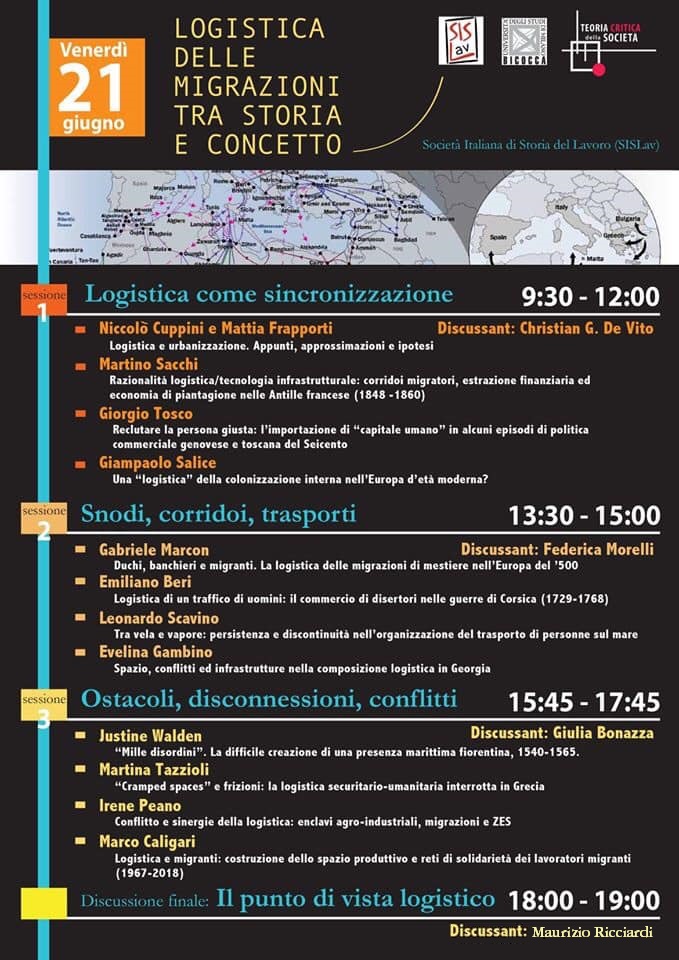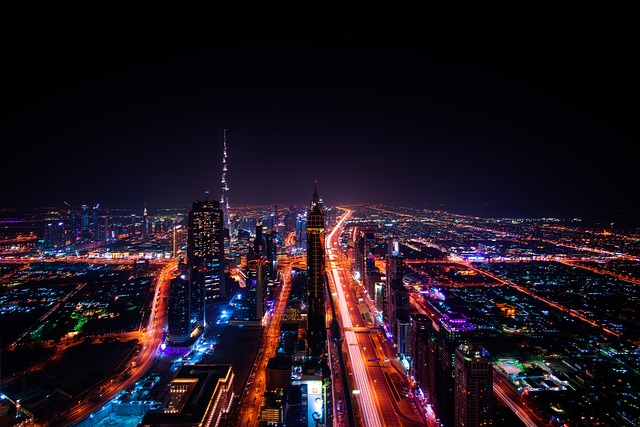Into the Black Box will participate to Historical Materialism conference in Athens next 2-5 of May.
We prepared a specific panel on logistics in global world with 5 speeches by IBB members.
Here we propose you the introduction to the panel and the abstracts.

5 May 2019
10:30/12:15
Panteion University of Social and Political Sciences
B3 Room
Counter-logistics trajectories within, against and beyond the binary sovereignism vs globalism
Panel proposed by: Into the Black Box
The contemporary political landscapes is structuring around a dichotomy. Media, politicians, intellectuals, tend to describe the actual dynamics around this polarity: on one hand the multifaceted “sovereignist/populist” front; the “globalist/liberalist” on the other. This narrative criss-crosses at many different latitudes the historical paradigm left/right, re-defining the political arena according to this field of tensions. What this panel intends to elaborate is a critical perspective to deconstruct this binary, starting from the hypothesis that we are not confronted with a clear opposition, but rather there are many multiple interconnections connecting the two fronts. In other words, the “return of the State” as the only political actor and the intensification of neoliberal globalization processes are somehow the two faces of the same economic and political capitalist crisis and of the crisis of the global hegemony of the so called “Western World”.
Even if within the deep heterogeneity of perspectives, the Marxian theoretical corpus (from Marx itself to the World System Theory) demonstrates how the State building and the affirmation of a capitalist mode of productions have historically gone hand in hand. The erection of the borders of the State have gone parallel to the construction of the borders of private property. The political space of the international arena and the economic space of the expanding frontiers of capital describes a common framework as historical processes. Capitalism considered as a system implies the continuous reproduction of both forms, even if there have been different assemblages and equilibriums in each historical phase.
To challenge the dichotomy “sovereignism vs globalism” and to open up a new internationalist perspective we propose to adopt logistics as a lens. Starting from the wave of struggles that have invested the logistics sector in the last decade, and on the more general logistical paradigm that is increasingly adopted to understand the recent cycles of struggles at the global scale and within critical theory, the panel will present some logistical insights based on recent struggles and theoretical emerging frameworks.
Mattia Frapporti: Sovereignism vs Globalism: a misleading rhetorical opposition
Analyzing the very beginning of the so-called “European integration process”, we will see how the seemingly paradoxical opposition between sovereignism and neoliberal globalism is not just a misleading dichotomy, but it has rather been the tension that has drove historical process such as the European integration. In other words, the European Coal and Steel Community which lead to the first structured “European Logistics Space”, was anything but an operation driven by the combination between raison d’Etat and globalization, which is precisely the way in which capitalism is operating nowadays.
Carlotta Benvegnù: Public/Private role in the expansion of Paris
The continuous expansion and internal fragmentation of the Paris metropolitan area during the last decades have been endowed by a logistical matrix. Not only in terms of the necessity of applying a circulation paradigm to this urban expansion, but also because the logistics sector has had a crucial role in it. The constant movement and changes of new logistics warehouses, in search for better economic conditions and more exploitable pools of labour force, has been a crucial vector of the Paris urban texture shift of the last decades. This speech will discuss this perspective focusing on the shifting role of public and private actors in leading this process, to challenge the recent emergence of the “sovereignism vs globalism” dichotomy from a situated and on the ground point of view.
Niccolò Cuppini: The logistics of struggles
Logistics is one of the main logics of contemporary capital. The “just in time and to the point” rationality shapes globally all the productive and distributive systems. The dream to annihilate the space and time between production and consumption, reducing to zero the time of profit realization, is the fantasy of contemporary capital. However, in the last years we have assisted worldwide to the emergence of an heterogeneous set of struggles pointing exactly against this nodes, showing at the same time the pervasiveness and the weakness of logistics. From port strikes to the union organization in many logistical choke points, from the struggles of the riders of the digital platforms to the spreading of the practice of the blockage, there is a logistics rationality of the struggles that have to be taken into account and analysed. Therefore, this speech will tackle this topic from both a cartography of global struggle and an analysis of their critical theories.
Floriano Milesi: Amazonization
Riding the effects of the retail revolution, Amazon is one of the principal actors of the so called Platform capitalism. With a rapid growing and a huge investment on innovation and research, and the not irrilevant fact that the founder and CEO is the richest man in the world, Amazon is totally changing the organization of the retail sector. Nevertheless, define Amazon just as a retail company resize wich is Amazon really is: a tech company that is try to redefining a new organization of the entire production chain. In fact, Amazon is just a part of the complex multidimensional global production chain. Global chain that through its own organization and logistics infrastructure is able to approach the ideal of just in time, capable of reorganizing the flows of goods and production according to the need of the moment through and below borders. A production chain that also uses more and more automation, which reduces “management” costs and increases production efficiency. This speech will inquiry in this context how the sovereignistic turn of global politics hits this model, and how workers are struggling and organizing themselves trough this new order.
Maurilio Pirone: Resisting the power of platforms
Digital platforms seem to be the point of connection between a reticular organization of work (which is scattered in a plurality of spaces and times coordinated rather than centralised) and information and communication technologies. The image of the platform generally indicates a new mode of enterprise based on sharing, aggregation of offer and demand, horizontality of exchange. It is, in reality, a business model that is radically transforming the labour market, the organisation of the production process and the forms of consumption. At the same time, however, it is clear that strong inequalities are created where platforms seem to be able to impose themselves as a winning business model, while riders often complain about a lack of protection in terms of rights and salaries. So, meanwhile new forms of Marxian real subsumption are going on, resistances and struggles whitin or outside the platforms develop contesting the algorithmic power to manage flows.



